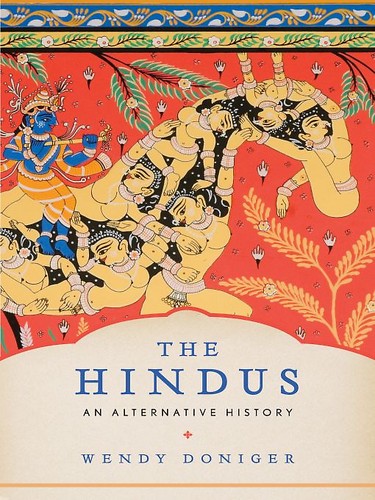 Each day leading up to the March 11 announcement of the 2009 NBCC award winners, Critical Mass highlights one of the thirty finalists. Today, NBCC board member Eric Banks discusses nonfiction finalist Wendy Doniger's The Hindus: An Alternative History (Penguin)
Each day leading up to the March 11 announcement of the 2009 NBCC award winners, Critical Mass highlights one of the thirty finalists. Today, NBCC board member Eric Banks discusses nonfiction finalist Wendy Doniger's The Hindus: An Alternative History (Penguin)
In The Hindus: An Alternative History, Wendy Doniger relates a Tamil story retold by her late colleague A.K. Ramanujan that could serve as a metaphor for her enterprise. The Brahmin wife of a sage is sentenced to death by her husband. At the moment she is to be beheaded, she embraces a Pariah, and both are decapitated. When the husband remorsefully restores them to subsequent life, their heads are transposed by mistake—and the resulting Brahmin-with-a-Pariah-head and Pariah-with-a-Brahmin-head require a unique set of sacrificial practices. “Such a conflation is not a monstrosity, nor is it a mistake—or if it is, it is a felix culpa.” Drawing on that felicitous fault—the mismatched heads a proxy for mixtures of caste but also the pure-gods-go-crazy meeting of southern India and north, the boomerang between earthy folklore and venerated text –Doniger asks “not where the disparate elements originate but why they were put together and why kept together. The political implications of regarding Hinduism as either a hodge-podge or, on the other hand, culturally homogeneous or even monolithic are equally distorting; it is always more useful, if a bit trickier, to acknowledge simultaneously the variety of the sources and the power of the integrations.”
Trickier is an understatement in The Hindus: Like any good recovering Orientalist, Doniger is profoundly moved by her subject’s polyvalent inclusiveness and radical plurality, its sometimes impossible-to-square dualities, its centuries-long knack for sticking the wrong head on the wrong body. The history she tells in The Hindus–which is very different from saying “her history of the Hindus”–involves as one might imagine vigorous explorations of the Rig Veda, the Brahmanas and the Upanishads, and those epics of the Indian imaginary, the Ramayana and the Mahabharata. But what makes The Hindus a stunning and audacious work of cultural history is her equal commitment to that little tagline of the subhead: “An Alternative History.” In focusing on the experiences and representations of women and the outcast/outcaste Dalits as well as the fluctuating symbolic, economic, and sacrificial place of various animal species (particularly horses, cows, and dogs) across epochs, Doniger’s story alternates like a Slinky in perspectives and values and meanings—and portrays a Hinduism absorbing and refracting a cluster of heterogeneous practices.
For all its historical sweep, The Hindus is a surprisingly personal text, written with vivacious pluck and playful verve. Doniger switches back and forth between a lens wide enough to pack in the panorama of several centuries of subcontinental dynastic history and conquest and one microscopically sharp enough to sort through the granular life in the hoariest myth. Whether writing on bhakti devotional practices of the South or the complicated aftermath of Raj Orientalism, Doniger never misses the bigger picture for the intimate or allows the broad view to get in the way of the key detail. Much as the dynamics of exclusion are a central—maybe the central—part of her interpretation and understanding of the religious complexes of South Asia, The Hindus is acutely sensitive to delve into much in addition to the canon of revered texts. (“To the accusation,” she writes, “that I cited a part of the Hindu textual tradition that one Hindu ‘had never heard of,’ my reply is: Yes!, and it’s my intention to go on doing just that.”)
The Hindus is the passionate distillation of a career’s work by one of the most accomplished Sanskritists of the past century, a generous and ambitious and gregarious book. As she writes about placing the Ramayana in its historical context, she amply shows how “the human imagination transformed the actual circumstance of the historical period into something far more beautiful, terrible, challenging, and elevating than the circumstances themselves.” At a moment when fundamentalisms of all stripes make absolutist demands on the imagination, Wendy Doniger’s gift of The Hindus stands as a blessed alternative.
Click here to read an excerpt from The Hindus.
Click here to read an interview with Wendy Doniger on The Hindus.
The NBCC awards ceremony is free and open to the public, as are the readings by NBCC finalists on Wednesday, March 10. To purchase tickets to the reception following the awards ceremony, click here.


